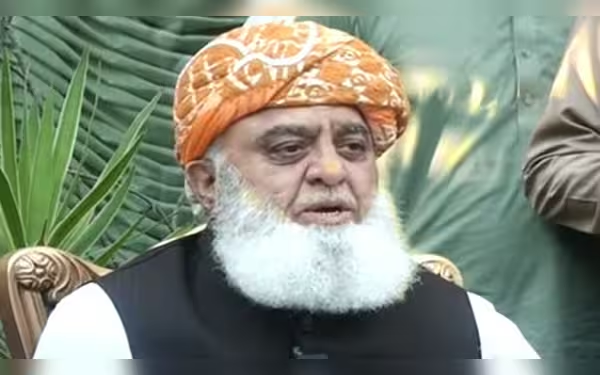Friday, October 4, 2024 08:35 AM
Fazlur Rehman Accepts Supreme Court Ruling on Defection Law
- Fazlur Rehman warns against political match-fixing.
- Supreme Court ruling allows votes against party lines.
- Concerns raised over government's legitimacy and haste.
 Image Credits: thenews
Image Credits: thenewsFazlur Rehman accepts the Supreme Court's ruling on defection law, warning against political match-fixing and urging caution on constitutional amendments.
In a significant development in Pakistan's political landscape, Jamiat Ulema-e-Islam (JUI-F) chief Maulana Fazlur Rehman has accepted the Supreme Court's recent ruling regarding the defection law. This ruling overturns a previous decision made in 2022, which had implications for how lawmakers could vote in parliament. The Supreme Court's unanimous decision is seen as a victory for the ruling coalition, as it allows votes from parliamentarians who do not follow their party's directives to be counted.
The Supreme Court's earlier verdict, delivered on May 17, 2022, had established that votes cast against party lines in specific situations—such as the election of the prime minister or chief minister, votes of confidence or no-confidence, constitutional amendments, and money bills—should not be counted. This ruling was decided by a narrow margin of 3-2, with three judges supporting the decision and two dissenting.
Now, with the new ruling announced by Chief Justice of Pakistan Qazi Faez Isa, the political dynamics may shift. Maulana Fazlur Rehman expressed his acceptance of the court's decision but cautioned against any potential "match-fixing" in the political arena. He emphasized that the ruling should not be exploited for political maneuvering or to facilitate horse-trading among lawmakers.
During a press conference in Islamabad, Fazl stated, "We accept the court's ruling, but there should be no match-fixing […] It should not become a mean of buying or selling." This statement reflects his concerns about the integrity of the political process, especially with the government pushing for constitutional amendments.
Fazlur Rehman also raised concerns about the government's legitimacy, suggesting that it does not truly represent the people's will. He urged the government to postpone any constitutional amendments until after the upcoming Shanghai Cooperation Organisation (SCO) summit, which is set to take place on October 15 and 16 in Islamabad. He believes that internal political disputes should be set aside during this crucial time.
In a related context, the JUI-F chief pointed out that his party has never engaged in "floor-crossing"—the act of switching allegiance from one party to another—highlighting a commitment to party loyalty. He also criticized the government's haste in pushing through constitutional changes, noting that it took nearly nine months for the passage of the 18th Amendment, while now there is pressure to amend the Constitution within a mere 24 hours.
Fazlur Rehman further lamented the lack of progress on Islamic legislation, particularly regarding the registration of madrassahs, which remains unresolved. He indicated that the JUI-F and the Pakistan People’s Party (PPP) are working separately on their constitutional amendment drafts, aiming to reach a consensus.
In a recent statement, PML-N Senator Irfan Siddiqui mentioned that the proposed constitutional amendment had been discussed with Fazlur Rehman, who expressed his reservations but did not object to the formation of a constitutional court. This indicates ongoing negotiations and the complexities involved in reaching a political agreement.
As the political landscape continues to evolve, the implications of the Supreme Court's ruling and the government's proposed amendments will be closely monitored. The situation underscores the delicate balance of power in Pakistan's political system and the importance of maintaining integrity in legislative processes. The coming weeks will be crucial as various political factions navigate these changes, and the outcome may significantly impact the future of governance in the country.













